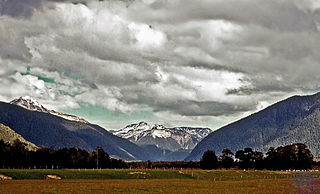Related Research Articles
Ashburton was a New Zealand electorate, first created in 1881 and centred on the South Island town of Ashburton.
Masterton was a New Zealand electorate from 1887 to 1946, focused on the town of Masterton and the surrounding area.

Waitaki is an electorate for the New Zealand House of Representatives that crosses the boundary of North Otago and South Canterbury towns on the East Coast of the South Island. The electorate was first established for the 1871 election that determined the 5th New Zealand Parliament. It has been abolished and re-established several times and in its early years was a two-member electorate for two parliamentary terms. The current electorate has existed since the 2008 election and is held by Miles Anderson of the National Party.

Eden, a former New Zealand parliamentary electorate, lay in the general area of the suburb of Mount Eden in the city of Auckland.
Riccarton is a former New Zealand parliamentary electorate. It existed from 1893 to 1978, and was represented by eight Members of Parliament.
Lyttelton is a former New Zealand parliamentary electorate. It existed from 1853 to 1890, and again from 1893 to 1996, when it was replaced by the Banks Peninsula electorate.

Grey, originally formed as Greymouth, is a former parliamentary electorate in the West Coast region of New Zealand. The electorate of Greymouth was created for the 1881 general election, and lasted until 1890. In 1890 the Grey electorate was created, and was abolished in 1919.
Timaru was a parliamentary electorate, in New Zealand's South Island. It existed continuously from 1861 to 1996 and was represented by eleven Members of Parliament.
Hokitika is a former parliamentary electorate in the West Coast region of New Zealand, based on the town of Hokitika. It existed from 1871 to 1890 and was represented by nine members of parliament. For a time, it was one of the two-member electorates in New Zealand.
Waihemo is a former parliamentary electorate in the Otago region of New Zealand. It existed for two periods and was represented by two Members of Parliament.
Wairau was a parliamentary electorate in the Marlborough Region of New Zealand. It was one of the initial 24 New Zealand electorates and existed from 1853 until its abolition in 1938, when it was succeeded by the Marlborough electorate. The electorate had 13 representatives during its existence. The 1861 election in the Wairau electorate was notable in that a later Premier, Frederick Weld, was unexpectedly and narrowly defeated by William Henry Eyes.
Hurunui was a parliamentary electorate in the Canterbury region of New Zealand, from 1902 to 1963.
Kaiapoi was a rural New Zealand electorate, north of Christchurch in the Canterbury region of New Zealand from 1861 to 1946. It was represented by twelve Members of Parliament.
Westland was a parliamentary electorate in the West Coast of New Zealand from 1866 to 1868 and 1890 to 1972. In 1972 the Tasman and West Coast electorates replaced the former Buller and Westland electorates.
Ellesmere was a parliamentary electorate in the Canterbury region of New Zealand. It existed for two periods between 1861 and 1928 and was represented by six Members of Parliament.
City of Dunedin, during the first two parliaments called Town of Dunedin, was a parliamentary electorate in Dunedin in Otago, New Zealand. It was one of the original electorates created in 1853 and existed, with two breaks, until 1905. The first break, from 1862 to 1866, was caused by an influx of people through the Otago gold rush, when many new electorates were formed in Otago. The second break occurred from 1881 to 1890. It was the only New Zealand electorate that was created as a single-member, two-member and three member electorate.
Oamaru was a parliamentary electorate in the Otago region of New Zealand, during three periods between 1866 and 1978.
Richard Moore was an independent conservative Member of Parliament in New Zealand and Mayor of Kaiapoi.
John Miles Verrall, also known as John Miles Verrell, was a 19th-century Member of Parliament in Canterbury, New Zealand. In his later years, he was known throughout the country as an advocate for a state bank.

The 15th New Zealand Parliament was a term of the New Zealand Parliament. It was elected at the 1902 general election in November and December of that year.
References
- McRobie, Alan (1989). Electoral Atlas of New Zealand. Wellington: GP Books. ISBN 0-477-01384-8.
- Scholefield, Guy, ed. (1940). A Dictionary of New Zealand Biography : A–L (PDF). Vol. I. Wellington: Department of Internal Affairs . Retrieved 6 October 2013.
- Wilson, James Oakley (1985) [First published in 1913]. New Zealand Parliamentary Record, 1840–1984 (4th ed.). Wellington: V.R. Ward, Govt. Printer. OCLC 154283103.